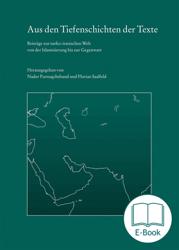Being case studies, the contributions to this volume highlight various aspects of the Turco-Iranian world starting from the Islamization in the 7th century up to the present day. Covering the broad geographical spectrum spanning from the Bosporus via Upper Mesopotamia (the jazīra), Iran, Afghanistan and Central Asia to India and the border regions of China, and shedding light on this area from historical, philological, literary and ethnological perspectives, the individual case studies are devoted to studies of urban, local and regional history, various forms of historiography and questions of legitimizing authority. What all contributions have in common is a reference to the research areas and interests of Prof. Jürgen Paul, to whom this volume is dedicated on the occasion of his 70th birthday.
Being case studies, the contributions to this volume highlight various aspects of the Turco-Iranian world starting from the Islamization in the 7th century up to the present day. Covering the broad geographical spectrum spanning from the Bosporus via Upper Mesopotamia (the jazīra), Iran, Afghanistan and Central Asia to India and the border regions of China, and shedding light on this area from historical, philological, literary and ethnological perspectives, the individual case studies are devoted to studies of urban, local and regional history, various forms of historiography and questions of legitimizing authority. Even though the methodological approaches to the processing of diverse genres of textual materials and documents are diverse, the contributions present a vivid picture of the Turco-Iranian world in past and present; a world that has always occupied a prominent position as being a driving force behind the intellectual and political history of the Islamicate world. It represents a Eurasian intersection, a junction to the Silk Road and later to the hegemonial efforts of Russian (Central Asia, Iran), British (India, Iran) and Chinese (East Turkestan) interests. As such, since the dissociation of the sovereign Islamic rulers, this Greater Region has been a constant bone of contention for foreign powers, which finally led to its division into various spheres of interest in the 20th century. Looking at it from this perspective as well, this volume aims to point out implicitly the central importance of this Greater Region in the last 14 centuries. The results presented here are all based on original sources, which have been condensed textually within the above-mentioned spatio-temporal coordinates. This way, the reader is enabled to recognize how complex the patterns of linguistic interaction in the Turco-Iranian world might have been. Thus, while the Islamization began with the Arab conquests in the seventh century from the “southwest”, the volume also takes us to the outermost, northeastern periphery of Islamic civilization in Xinjiang in the 21st century. What all contributions have in common is a reference to the research areas and interests of Prof. Jürgen Paul, who, by means of his scientific work in Halle (Saale) and Hamburg, has rendered a lasting service to Turco-Iranian studies – especially in the field of historical studies. Therefore, this volume is dedicated to him on the occasion of his 70th birthday.
Nader Purnaqcheband, born 1972, is Lecturer for Persian at the Oriental Institute of the Martin-Luther-University Halle-Wittenberg since 2006. He studied Islamic Studies, Psychology and Political Science in Kiel and Cologne. He received his PhD in 2005 and habilitated in 2018. His current research fields include new methodological approaches to the history of thought and religious psychology from early Islam to the 16th century.
Florian Saalfeld, born 1988, studied Arabic Studies, Islamic Studies and Eastern Christianity (Oriens Christianus) in Halle (Saale). Stays abroad also took him to Cairo and Beirut. Since 2016 he is a research associate at the University of Bonn within the framework of the DFG-funded Collaborative Research Centre (SFB) 1167: ‘Macht and Herrschaft – Premodern Configurations in a Transcultural Perspective’. For his PhD, he is working on narrative strategies for (de-)legitimizing Herrschaft (authority) in Indo-Persian historiographical texts from the Sultanate of Delhi. He also focuses on the composition of elites within Mamluk ruling systems.


 Sample
Sample